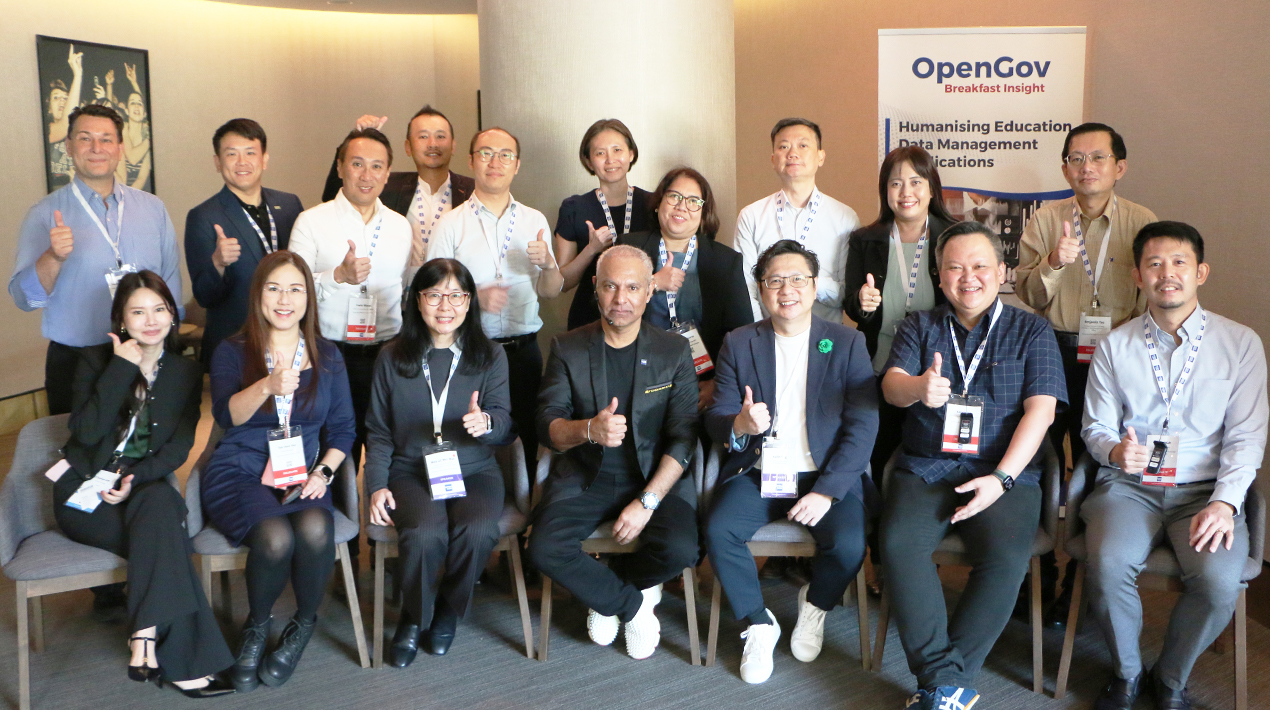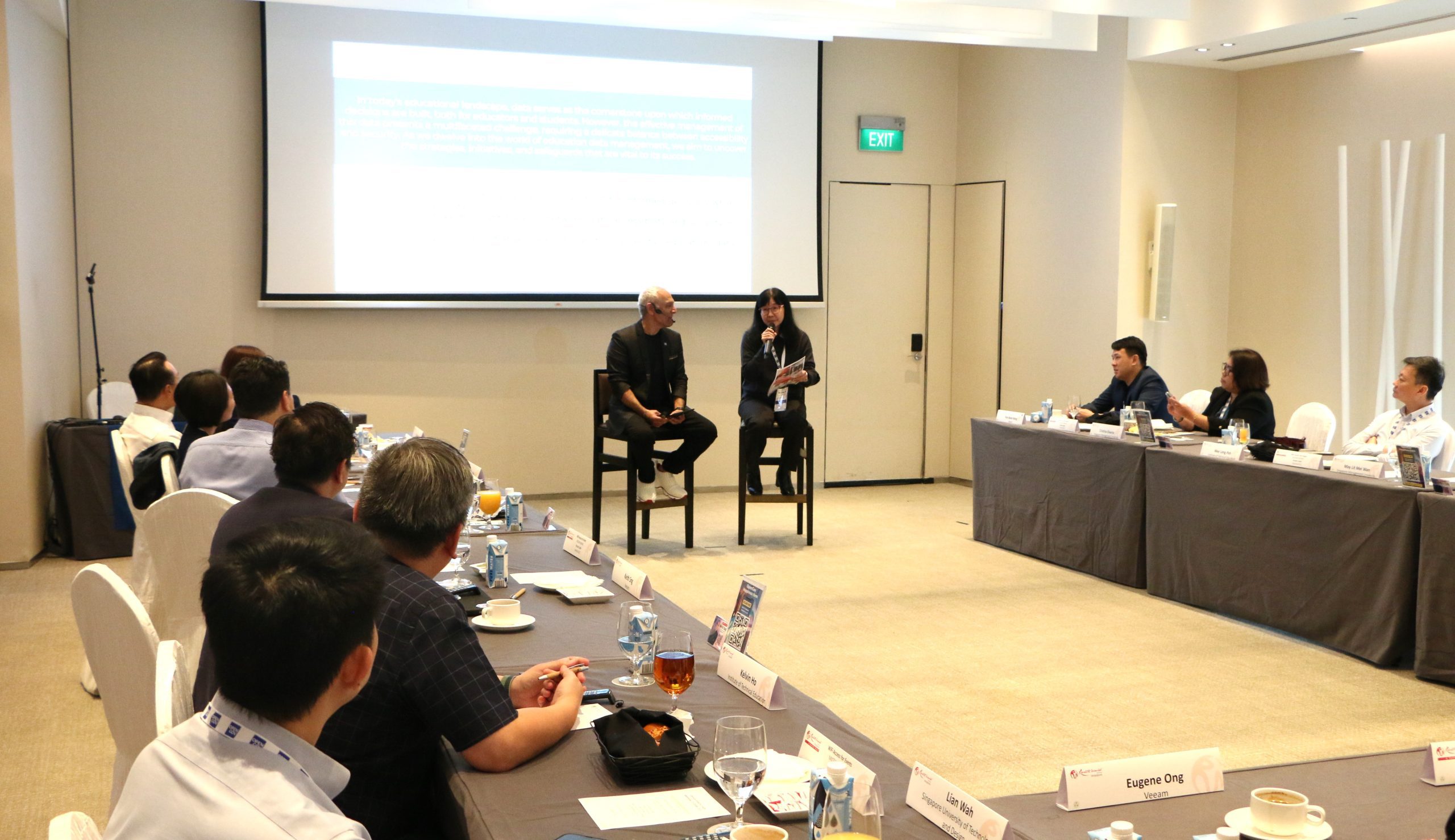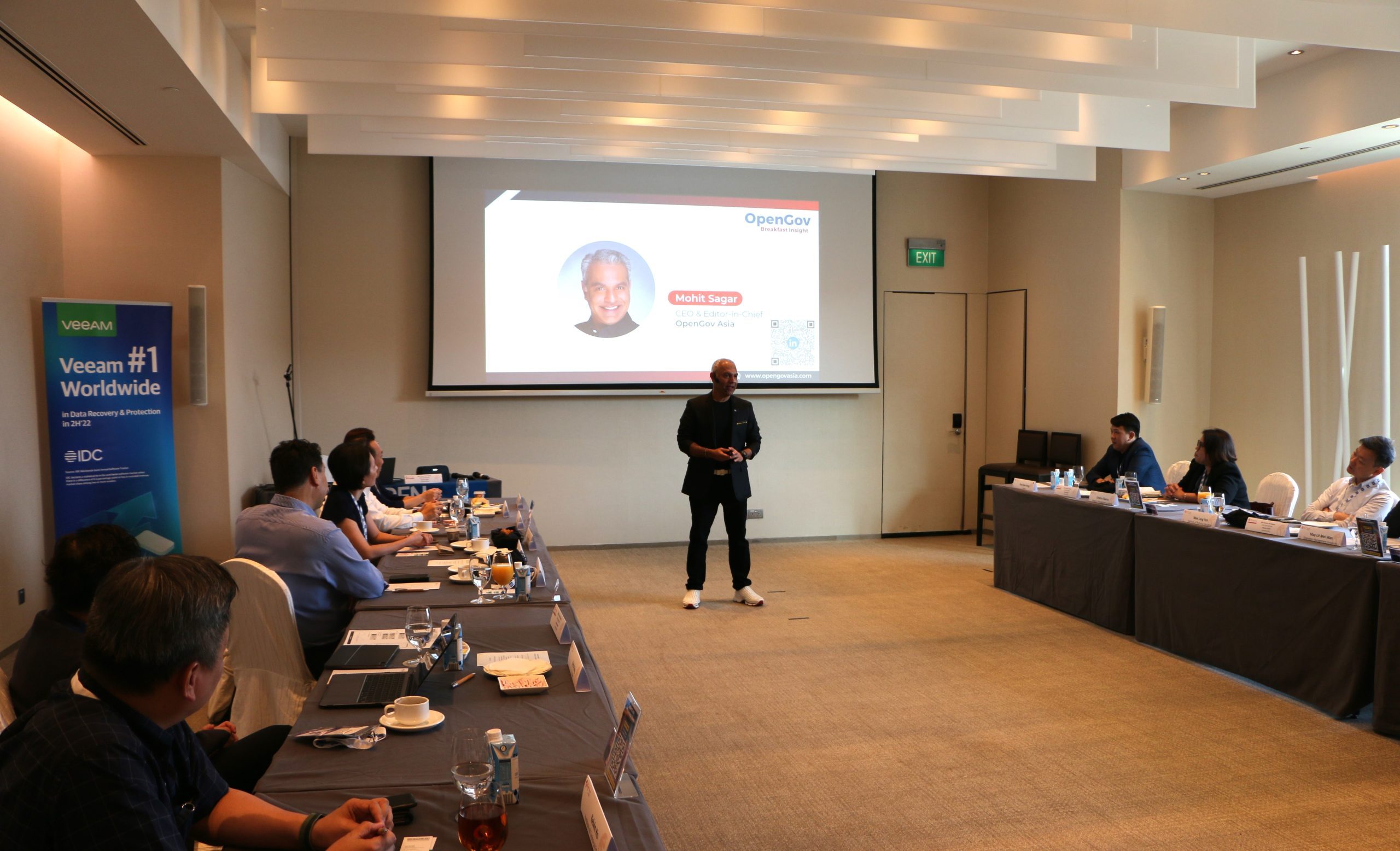
|
Getting your Trinity Audio player ready...
|
The OpenGov Breakfast Insight held on 25 October 2023 at the Hard Rock Hotel, the first of a double-header day for OpenGov Asia, kicked off with a dynamic and insightful discussion that underscored the transformative potential of data in the education sector.
Singapore’s education system is at the forefront of digital innovation, with a focus on using technology and data-driven approaches to transform learning and teaching, while also emphasising the importance of data management and security in educational institutions.
In Singapore’s ongoing commitment to achieving educational excellence, the importance of reliable data management has become increasingly critical, underscoring the fact that data serves as the lifeblood of educational institutions in the digital age.
High-quality data serves as the foundation for informed decision-making and insightful analysis, essential for educational institutions to effectively fulfil their mission of delivering exceptional education, thereby underscoring the importance of accurate, reliable and up-to-date data.
To empower educators and administrators with essential insights, data should be readily accessible to authorised users, thereby laying the foundational step for informed decision-making and optimised learning experiences.
In this context, data governance stands as the bedrock for preserving data quality by implementing stringent processes that ensure data consistency and integrity, addressing not only quality concerns but also meeting the rigorous standards of audits and compliance mandates.
Integrity, confidentiality, and security must be protected at all costs when dealing with data. To ensure the preservation of crucial information, institutions must not only secure their data but also be vigilant about backup, replication, and archival procedures.
A unified approach to data usage enhances operational intelligence, streamlines decision-making processes, and creates a trusted data source throughout the institution. Simultaneously, ensuring data integrity, confidentiality, and security is not only vital for the institution’s seamless operation but also a mandatory compliance measure in today’s digital landscape.
Moreover, ensuring uniformity in the utilisation of decision-making data across various departments is of utmost importance, as untapped data that remains unanalysed or inconsistently accessed can impede an institution’s operational intelligence – a crucial element for making informed, strategic decisions.
As data-driven solutions continue to play a central role in education, all members of the organisation must be proficient in data management best practices. Essentially, an institution’s proficiency in data management is contingent on the expertise and competencies of its faculty and staff.
By embracing cutting-edge technologies that harness the power of data, educational institutions can unleash the potential for highly personalised learning experiences through the seamless integration of data analytics, artificial intelligence (AI) and other innovative solutions.
The OpenGov Breakfast Insight held on 25 October 2023 at the Hard Rock Hotel focused on the dissemination of invaluable insights concerning digital integration, cybersecurity, cloud computing, and data governance, uniquely tailored to the Singapore education sector.
Opening Remarks

In the rapidly expanding landscape of digital education, Mohit Sagar, CEO and Editor-in-Chief of OpenGov Asia, acknowledges the growing focus on humanising data management, aiming to enhance learning experiences through the incorporation of empathy, ethics, and efficiency in data systems.
This approach revolves around two core pillars: improving data accessibility and availability while maintaining data integrity and confidentiality. By doing so, educational institutions can foster a culture of excellence, providing students with a more personalised and efficient educational journey.
Mohit stressed that one of the foundational principles in modern education data management is enhancing data availability and accessibility. This involves ensuring timely access for educators, administrators, and stakeholders.
“Easy access to data is fundamental in the decision-making process, allowing educators to make informed choices and deliver the best possible learning experiences,” Mohit believes. “Real-time insights into student performance and behaviour can lead to more effective interventions and support systems.”
In this context, robust data governance is a cornerstone of educational evolution, where data quality and authenticity hold paramount significance. Standardising data collection approaches and formats, instituting validation procedures, and improving data accuracy are integral measures for safeguarding data reliability in contemporary education.
Educators and administrators are encouraged to base their decisions on data, fostering a more informed and efficient approach to teaching and management, while fostering cross-departmental collaboration to gain a comprehensive perspective on the institution’s data.
High-quality data is indispensable for accurate reporting, effective decision-making, and meaningful analysis. Through the sharing and analysis of data, educators can gain comprehensive insights that enable more effective interventions and support for students, all while acknowledging the paramount importance of data security in safeguarding data integrity and confidentiality.
Data management has assumed a central role as a crucial element in enhancing learning experiences and decision-making, with educational institutions now adopting regular security audits, comprehensive data backup and recovery strategies, as well as disaster recovery protocols to ensure the security and integrity of educational data. These measures are specifically designed to protect valuable information from unforeseen challenges, spanning from system failures to cybersecurity threats.
Maintaining transparency in breach response is of utmost importance, allowing educational institutions to address potential security incidents openly, rebuild trust among stakeholders, and take preventive measures to strengthen their data defences.
Mohit observes that leveraging cutting-edge data-driven technologies has become a game-changer in education. Tools such as artificial intelligence (AI) for data validation, machine learning (ML) for valuable insights, and predictive analytics for anticipating student performance are revolutionising the teaching and learning experience. They empower educators to make data-informed decisions, personalise learning, and optimise resource allocation for improved educational outcomes.
Transparent data governance, interoperability solutions, and shared data standards are instrumental in fostering trust and seamless integration across educational institutions, allowing for the free flow of insights and innovations.
“In an increasingly digital, data-centric world, education cannot afford to fall behind,” Mohit concludes. “Therefore, it is crucial to drive rapid innovation through data and cultivate an agile mindset among educators and stakeholders.”
Welcome Address

Keith Sng, Senior Manager, Systems Engineering SEAK at Veeam acknowledges that rapid technological advances and continuous efforts to develop the education sector have made Singapore one of the countries that prioritise education.
Singapore is known globally for its superior education system, which places special emphasis on developing individual knowledge and skills. In addition, Singapore also hosts various international seminars, conferences and educational events that promote global collaboration in support of learning and research.
In terms of technological advancement, as per Keith, Singapore has emerged as a prominent hub for innovation and technology within Southeast Asia. On the education front, both the government and educational establishments in Singapore have proactively incorporated technology into their educational programs, encompassing the utilisation of advanced educational software, digital libraries, and online learning platforms.
“Singapore’s commitment to education is reflected in its continuous efforts to improve the quality of education and ensure that its citizens have equitable access to learning opportunities,” observes Keith.
Nonetheless, Keith underscored that while significant infrastructure developments are unfolding in Singapore’s education sector, equal attention must be directed towards safeguarding the data of educators, staff, and students. “Data constitutes the foundation of everything in today’s world; let’s not jeopardise this valuable resource due to negligence in ensuring its proper and judicious protection.”
Keith pointed out that two universities, namely Parol University in India and Keio University in Japan, have already begun to recognise the significance of data protection. These institutions serve as exemplars in embracing data protection measures that can serve as guiding models for educational establishments worldwide.
He explains, “Their commitment to establishing a secure and safeguarded educational environment is a valuable attitude that should be collectively embraced.”
Veeam provides support to both universities in their efforts to protect their data. Collaboration with Veeam allows both universities to implement sophisticated and reliable data protection solutions. With the help of Veeam, their data becomes safer and protected from potential risks and security threats.
This successful collaboration illustrates how the application of technology in education can provide real benefits. When educational institutions prioritise the security and sustainability of their data, they create an environment that supports educators and students in achieving their academic goals.
Keith believes that the current rapid technological developments have advanced the world of education but also brought new risks related to data security and integrity. Therefore, the steps taken within the framework of this cooperation are very relevant and useful. When educational data is well maintained, not only students feel the benefits, but also educators and administrative staff can work more efficiently.
“In an era where data-driven technologies increasingly dominate, education leaders around the world need to consider investing in data protection and the latest technology,” Keith concludes. “The more educational institutions take proactive steps in protecting their data, the safer and more productive their learning environments will become.”
Fireside Chat

May Lit Mei Wan, serving as the Senior Associate Director for Learning Systems and Technologies at Singapore Management University (SMU), one of Singapore’s universities that has harnessed data within its academic institutions, underscored the intricacies involved in efficiently handling this data. She emphasised the necessity for a meticulous equilibrium between accessibility and security to address the manifold challenges it poses.
“In an era where technology increasingly influences the world of education, data is a key element that shapes the way we learn and teach,” she explains. “With the right data, educators can identify individual needs, measure progress, and create more personalised learning experiences. Apart from that, students can also see their progress and use it as a basis for improvement.”
However, managing education data is not a simple task. It requires strong infrastructure, wise policies, and reliable data protection. As data becomes more abundant and diverse, the challenges become more complex.
SMU has begun efforts to explore every angle of educational data management, from understanding basic concepts to practical applications. By collaborating with experts and practitioners in this field, SMU is aiming to outline the best strategies, innovations and solutions that can bridge the gap between the ease of access and data protection.
“Through a deeper understanding of how data can shape the future of education, we hope to provide useful insights and inspiration for educators, administrators, and anyone who cares about improving education,” May explains.
SMU is eager to delve into cutting-edge technological advancements that can propel educational data management to new heights. She shares specific instances of how data has been effectively utilised by SMU in various real-world scenarios, exemplifying the practical applications of data in diverse contexts.
For example, in measuring class engagement, SMU has integrated data from various sources, including online learning platforms and interactive systems in the classroom. This makes it possible to monitor student participation levels, engagement in discussions, and responses to learning materials. This data provides valuable insight for assessing teaching effectiveness and identifying areas where improvement is needed.
 May believes that data is an essential device for measuring student results in online exams. This data tracks individual grades, class averages, and long-term trends. By gaining deeper insights into student performance in online exams, educators can adapt their teaching techniques and curriculum to bolster student achievement.
May believes that data is an essential device for measuring student results in online exams. This data tracks individual grades, class averages, and long-term trends. By gaining deeper insights into student performance in online exams, educators can adapt their teaching techniques and curriculum to bolster student achievement.
Besides, the data has helped in identifying suspicious behaviour that may be detrimental to the integrity of the exam. This includes monitoring response patterns, unusual turnaround times, and potential unethical actions. This data helps in taking precautions and maintaining honesty in the exam process.
Likewise, measuring student effort in take-home assignments is another area where data plays a key role. By monitoring the time students spend completing assignments, the level of complexity of the work completed, and the results achieved, it is possible to measure student effort in assignments outside of class. This data helps in providing better feedback to students and motivates them to improve their performance.
“All of these initiatives are concrete examples of how effective data management can support quality education and better decision-making,” May reiterates. “By utilising this data, we have a strong foundation to continuously improve the educational experience and provide maximum benefits for students.”
Closing Remarks
In his concluding statements, Keith emphasised the remarkable advancements in the education sector, stressing the crucial role of the intersection between technology, data management, and education in shaping the sector’s future.
“As we reflect on the insights shared during the OpenGov Asia event, it’s evident that the transformation of education through data humanisation is well underway,” says Keith. “The convergence of data, education, and technology is reshaping learning experiences and outcomes, setting the stage for a brighter future in the education sector.”
Keith underscored the significance of data security and governance, noting that transparency in breach response, defining data ownership and accountability, and accurate data capture during collection are indispensable elements of data security in education.
The incorporation of data-driven technologies was a central theme throughout the event. By leveraging artificial intelligence (AI) for data validation, machine learning (ML) for valuable insights, and predictive analytics for student performance anticipation, the education sector is on the cusp of a major technological revolution.
Keith reiterated the vital aspects of data accessibility and availability, placing importance on user-friendly dashboards, mobile accessibility, and real-time interventions. He highlighted that transparency in data governance, interoperability solutions, and shared data standards serve as the foundational pillars for fostering trust and enabling seamless integration within educational institutions.
 To drive rapid innovation in education, the need for fostering an agile mindset among educators and stakeholders, in today’s world, is non-negotiable. Encouraging experimentation and continuous improvement, as well as promoting data collaboration by standardising data formats, are catalysts for shared development in the sector.
To drive rapid innovation in education, the need for fostering an agile mindset among educators and stakeholders, in today’s world, is non-negotiable. Encouraging experimentation and continuous improvement, as well as promoting data collaboration by standardising data formats, are catalysts for shared development in the sector.
Summarising the session’s discussion, Mohit concurs that data security and governance are of utmost importance in education. He emphasises the necessity of routine security audits, robust data backup and recovery strategies, and disaster recovery protocols. He underlines the significance of transparency in addressing breaches, defining data ownership, and maintaining the accuracy of data collection as essential elements in safeguarding the integrity and confidentiality of educational data.
“The integration of data-driven technologies in education was a standout theme,” observes Mohit. “The transformative potential of AI/ML and predictive analytics is evident, promising to revolutionise teaching methods and enhance learning experiences.”
The importance of data accessibility and availability was at the forefront, with a focus on user-friendly dashboards, mobile access, and real-time interventions. Transparent data governance, interoperability solutions, and shared data standards were acknowledged as essential pillars for fostering trust and facilitating seamless integration within educational institutions.
Fostering an agile mindset among educators and stakeholders was presented as a gateway to rapid innovation in education. Encouraging experimentation, continuous improvement, and promoting data collaboration through standardised data formats emerged as vital strategies for driving collective growth in the education sector.
“This event has renewed the passion for humanising data, propelling us closer to a future brimming with limitless learning possibilities,” Mohit concludes. “The world of education data management is set for remarkable transformations, and insights from this event serve as a beacon on the path forward.”
















